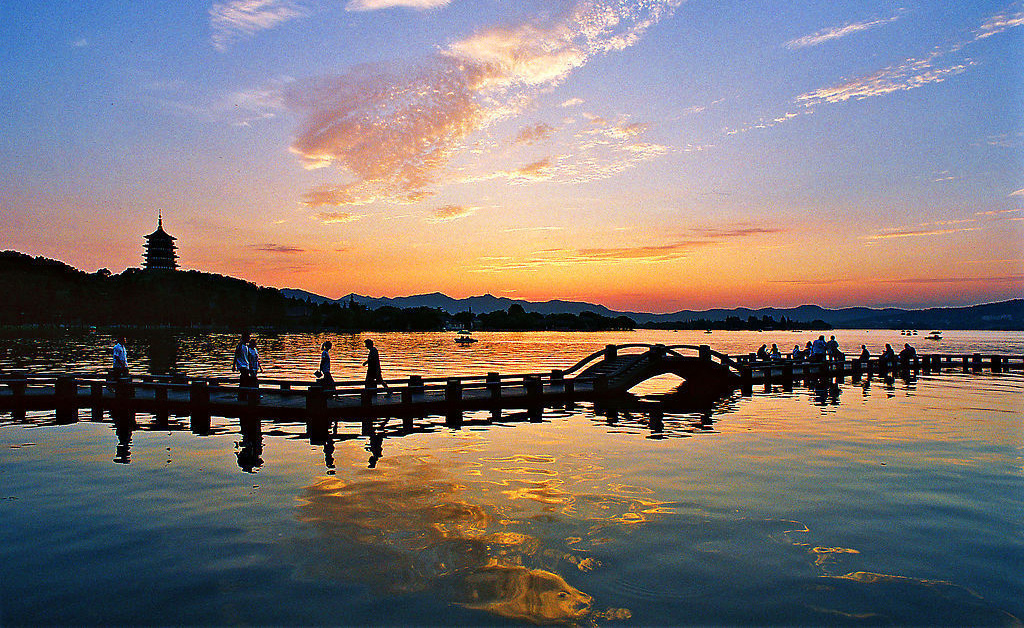Image of West Lake reflected in words of author Zhang Dai

Many Ming scholars usded a series of articles and poems known collectively as the "Ten Views of West Lake" in their depictions of the area.
By the late Ming Dynasty (1368-1644), travel had increased in popularity, and West Lake in Hangzhou worked its charm on visitors. Scholar Zhang Dai (1597-1684), a litterateur and historian, wrote more than 76 articles about West Lake. One of his most representative works, West Lake Dream Searching, created what would become the typical impression of West Lake for later generations. Reading Zhang’s essays on West Lake, depictions of bustling and lively scenes and visitors’ recreational activities stand out vividly, radiating an impression of vitality and the beauty of life. Zhang’s essays highlight the industrialization of tourism services, luxury-oriented focus of travel spending, and frequent festivals at West Lake, along with depictions of the materialistic pursuits of scholars of the late Ming era.
During the middle and later periods of the Ming Dynasty, a commodity economy developed significantly and Hangzhou residents increasingly opted to run businesses instead of pursuing scholarship or agricultural work. Urban residents began to focus on business opportunities and create new businesses, especially those relevant to tourism at West Lake. Tourism boomed in the West Lake area and Hangzhou residents made up the majority of tourism businesses, such as sedan bearers, boatmen, opera performers and street peddlers.
The emergence of the tourism industry at West Lake can be attributed to demand in Hangzhou. During the middle and late Ming Dynasty, the reconstruction and restoration of scenic attractions at West Lake stimulated the increase in visitors with varied needs.
Red boats floating on the water carried peddlers who not only sold goods, but also performers of Chinese operas in accordance with the growing demand for entertainment. In addition, a number of theatrical troupes resided along West Lake and Zhang’s essays left a significant legacy on depictions of the rich opera performances there.
In the mid-Ming Dynasty, the idea of “advocating consumption and opposing thrift” marked a significant transition in terms of the consumption preferences of ancient Chinese. The saying “Xiaojinguo,” meaning “pot of melting gold,” became popular in Hangzhou in the Southern Song Dynasty (1127-1279), and referred to a metaphor for the consumption of luxury products. The Hangzhou scholars of the time were proud to boast about their enjoyment at West Lake as a status symbol. Building ostentatious houses around West Lake was another way to show off their wealth.
With the growing economy and urbanization, spending money on tourism reflected the pursuit of material comfort and spiritual indulgence. This indicated Hangzhou residents’ recognition of material desires, leading scholars to adopt a preference for secular life in the city and embodying urban residents’ tastes.
Zhang also paid attention to the markets for incense and dragon boat races at West Lake. As a symbol of a developed tourist city, West Lake played a major role in the lives of scholars and residents. It was unique in terms of its role in religious and festival customs.
Link
West Lake Dream Searching is a collection of Zhang Dai’s essays from the late Ming Dynasty and the early Qing Dynasty (1616-1911). Zhang highlighted the prosperity of West Lake and wrote down his memories about his homeland. The book depicts the areas around Hangzhou providing a complete picture about the landscape, Buddhist temples and ancestral halls in Hangzhou. More importantly, Zhang included several earlier scholars’ poems that complemented his depictions of West Lake.

 PRINT
PRINT CLOSE
CLOSE